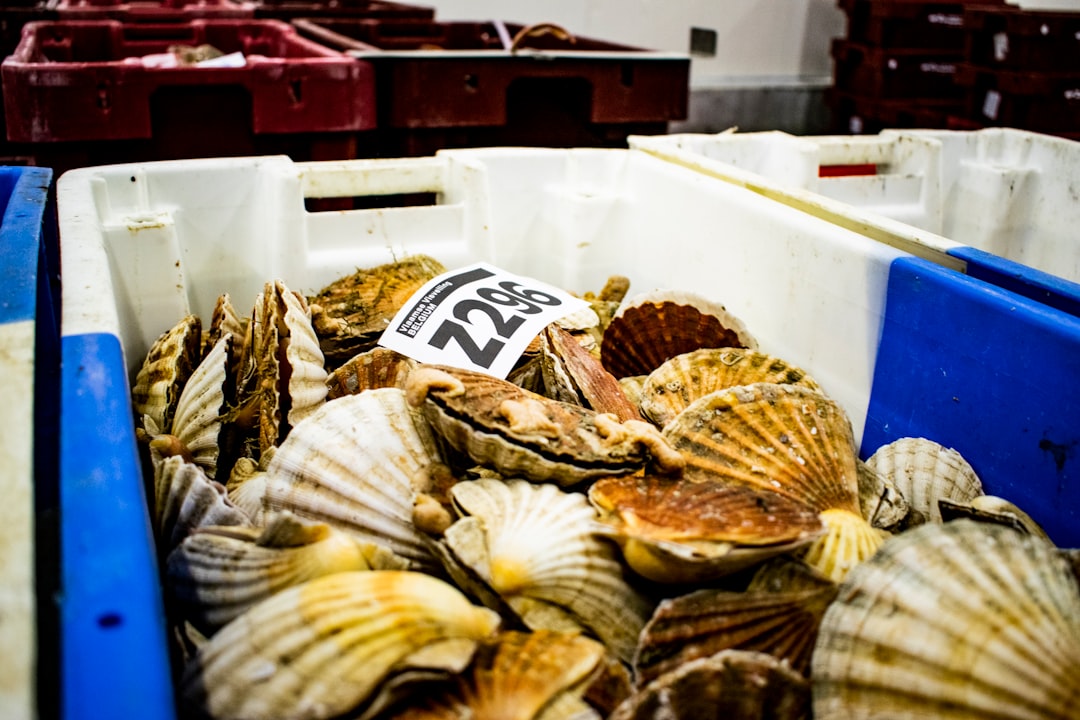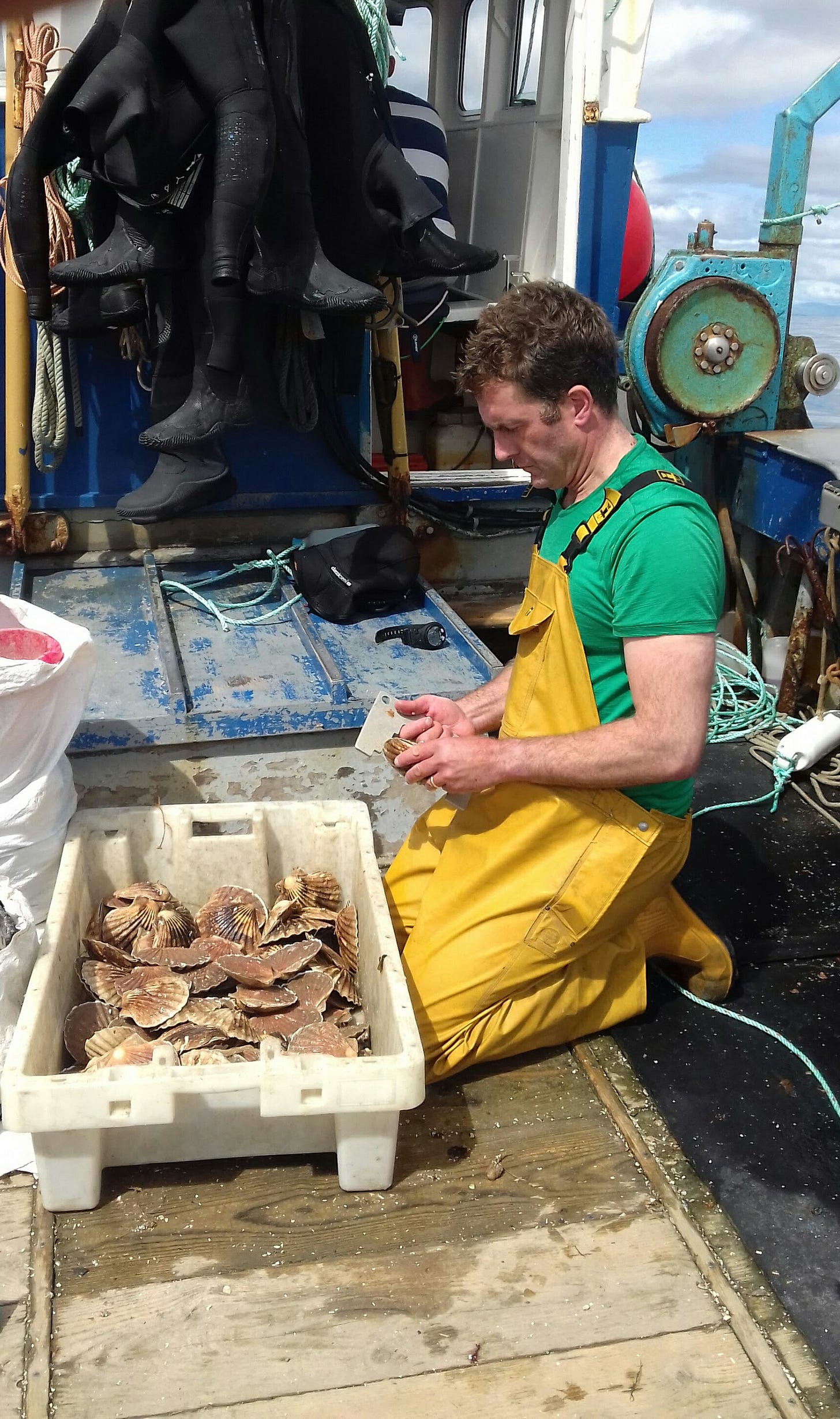
At 6 a.m. on a wet misty morning five years ago, the single lane road to where Guy Grieve’s boat is moored on Mull is so shrouded in cloud you’d think it was November, not the middle of spring. It’s a problem for Guy, a diver of hand-selected scallops on this island off the left-hand side of Scotland. Down south, across the English border, temperatures have risen to summer degrees. The high end restaurant chefs he supplies can’t imagine that any part of Britain might not be sauced in sunshine, quivering in heat. If this Scottish ‘dreich’ which has blanketed the Isle of Mull for weeks doesn’t lift, Guy won’t be able to fulfil their orders. Then what will Raymond Blanc at Le Manoir Aux Quat’ Saisons tell his summer-frocked diners? How will London’s theatre-world oasis, J Sheekey, keep its customers happy without the hand-dived scallops they pant to eat?
It’s fine for the scallop dredgers. Operating without quotas, they simply lower a chain mesh scoop into the water and hoover up everything lying on the seabed. It can hardly be called fishing. Dredges drag metal jaws through the shingle sediment of the ocean floor, ploughing it up to excavate scallops, and leaving behind a dead trench, habitats destroyed.
In 2019, the UK had 264 active scallop dredge vessels with an operating profit of £12.5 million. Landings by Scottish vessels accounted for 66 percent of that.
98 percent of scallops are caught by dredgers. Only 2 percent are collected by hand-divers like Guy. Scallop fishing on dredgers is a business worth well over £120 million annually, third in importance in the UK fishing industry. Pre-Brexit, it brought 600 jobs to the fishing sector and 750 to the processing end of the business. The dredging community argues that without their fishing methods, the European market which pre-Brexit bought more than 60 percent of the catch would turn to supplies from the US and elsewhere. Now much of it has. But there is still a UK market appreciative of hand-dived scallops.
We climb into a rib that takes us out to the Helanda. For several years, Guy did his hand-diving from just such a rubber dinghy, six, seven days a week, in every miserable kind of weather. Now that he has a proper boat, life is marginally easier. He and his two rotating divers can cook on the 2-burner hob, sleep on board, (the loo is a bucket hanging on deck), and dive far further out.
They need to. Guy points to the sonar screen on his boat where an ochre image of the seabed round Mull is thickly scribbled with magenta lines depicting trenches scored by dredgers. On this day, he and Libre (Leebray), a Scottish South African with more than a passing resemblance to Damien Lewis, will make three dives each of up to an hour and a half, depending on current and depth, to fill two net baskets a time. If they can.
In cloud touching the waves, we head for the Garvellachs. They’re a chain of uninhabited small islands in the southern Hebrides north of Jura, which can just be made out through the grey. If Scotland had any of the sun of the south, I’d be able to see the ruins of a 9th century monastery founded in 542 AD by Brendan the Navigator, and the beehive-shaped stone cells surrounding it. Guy and Libre wriggle into their wet suits. The boat bobs in a cocoon of silence. Then it’s ripped apart by the pump that fills the diving cylinders with oxygen. Here we are, with nothing but island-dotted sea for miles, and the shattering roar of the machine is worse than the ear-splitting cacophony of a major city building site.
Guy grins wryly at the irony of it. He feeds off silence. He tumbles backwards into the sea, two nets, two buoys in one gloved hand. Immediately he’s swallowed up by darkness. The boat drifts in a racket of noise. Libre cooks up coffee with creamer - the boat’s milk has curdled into yogurt - and scribbles in the log. I’m beginning to wonder how long it’s safe to stay down, and how would you know if anything had gone wrong, when an orange buoy bobs up onto the surface of the water in the distance. “First net filled,” says Libre. We stare outwards for what feels like hours then the second buoy, followed by Guy’s head, emerges from the sea. He’s been down for 40 minutes.
When the two nets are dragged on board, the men are sombre. They’re not nearly as full as they’d like, to complete his restaurant orders. Chefs in Scotland will receive the scallops, alive and packed in recyclable cardboard boxes, inside eight hours from being in the sea, and in England in under 20 hours.
“The sea bed’s rubble down there,” says Guy. “You can barely see for the swirling grit of dredging damage.” In 2008, 10,026 tonnes of scallops were dredged, bringing commercial fishing £25.1 million, around half the total UK scallop catch, sold cleaned and shelled, that is to say, dead.
The sum of the total operating profit of revenue-dependent vessels increased from £2.4 million in 2008 to £10.3 million in 2015 and, with dredging, goes on increasing, as stocks diminish.
Guy turns the boat and we head for other grounds. There’s no equipment that can predict a good scallop habitat. You have to dive down to the bottom of the ocean before you know if it has scallops to yield.
Around lunch, Guy pries open three shells and caramelises the scallops in a smear of oil in a searing hot pan then hands them to me.
They are what eating sea air would be like if made of marshmallow, and almost as sweet. I’m swallowing part of Guy's livelihood. He and Libre crunch through Jacob’s Cream Crackers and drink tea out of jam jars.
At the end of eight hours’ diving, eight sacks are filled. With each landed catch, Guy and Libre have sorted them with a steel measure into large, medium, and too small.
The small ones fill a crate. While legal to sell, they will, on the way back to shore, be tipped back into the sea in an area Guy hopes a dredger won’t find, to grow larger.
Dredgers make no such distinction. “All three-dimensional life is destroyed. It’s such short-term thinking.” That April, a scallop dredger, operating legally, fatally damaged a flame shell reef in Loch Carron. The area has now been declared a Marine Protected Area where dredging is banned.
But an MPA designation isn’t necessarily a protection. “They’re parks on paper,” says Guy. “There are no rangers or bailiffs to protect them like you’d find in conservation areas on land.” The area of the sea protected by MPA status is so small. Post Brexit, says Guy, we must ensure that the MPA programme continues and is properly policed. One MPA zone off Mull has been regularly poached by a dredger.
“It’s not just about us. The maintenance of the eco system helps tourism. Scottish tourism is also about our sea life, the whales and the dolphins, the sea eagles. It’s a £37 billion a year industry. Dredging and trawling is a £199 million industry but it’s destructive. Politicians need vision, not go scrambling for votes. Science has proved static fishing can be profitable. Look at Norway.”
Norway has banned scallop dredging 12 miles from its coast. The result has been an increase in the number of divers and greater profitability - hand-dived scallops, sold live, are far more lucrative than dredged scallops, sold cleaned and shelled and dead. Creelers and hand divers in Scotland are battling with the Scottish government to establish a 3 mile limit. Environment Secretary of the day, Roseanna Cunningham, said, "While we recognise there are concerns around scallop dredging in coastal waters, we must balance environmental concerns with the need for legitimate and sustainable fishing."
“The mistake of British politicians,” says Guy, “the grand mistake, is not thinking about fishing alongside the environment. Environmentalists view the issues separately. But fishermen are hunters, not farmers. They go after everything. Left to restore itself, marine life will survive. We need to keep the marine environment wild, not simplified, not degraded, or it’ll be a rush to the bottom. We’ll end up with nothing but scallops. What creel fishermen and divers do isn’t the preserve of the privileged and rich, and it can’t be separated from the whole fishing debate. Over 79 percent of fishermen in Scotland are static fishermen, using static nets, creels, rod and line or hand diving. They can report what they see is happening.”
In the late afternoon, we drive from the boat on the last stage of the working day towards Salen, a small coastal village in the centre of Mull. Here, the scallops will rest in the sea in nets under the pier for 24 hours to be washed clean by the ocean. Then they are boxed up and sent on their journey to the restaurants of the south. The road passes a small cluster of rocks not far from the shore. “We picked up a whole ton of scallops round that little island. The distance between it and the shore was too tight for the dredgers.” Guy and Libre laugh in delight.
Five years on from that magical voyage, there's no laughing now. The Ethical Shellfish has been forced to close. Reason 1, Brexit and the difficulty in hiring workers; Covid, reason 2. Reason 3? Second home owners. So many businesses in British beauty spots can't compete with the seasonal second homes market to accommodate their annual workers. The Ethical Shellfish Company, unable to house its employees, has now shut.
But here is Guy's trick for that vital crust on a scallop that prevents it from drying out. Pour a scant amount of olive oil into a saucer. Meanwhile, put a dry heavy-bottomed frying pan on high heat. Quickly and lightly dip one side then the other of each scallop you're cooking into the oil then set at once into the scalding hot pan. Sear for just over a minute then turn and sear the other side a further generous minute. The scallop will continue cooking after you've set it on hot serving plates.








Another wonderful piece. I was blissfully unaware of the dredging method of harvesting scallops. Now that I know (thank you, Julia), I feel less sad about the general lack of availability of scallops here in Portugal, which I think may be cultural. Now I just have to hope that the razor clams I so enjoy are not dredged up the same way.
Very interested in this story Julia. I have boycotted divinely scrumptious scallops for several years now, not wanting to inadvertently support dredging; knowing more facts and the reality facing the divers who hand pick scallops is illuminating. We endeavour to buy only line caught or hand harvested seafood or, more fun: catch our own :)